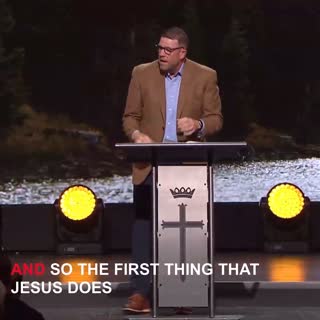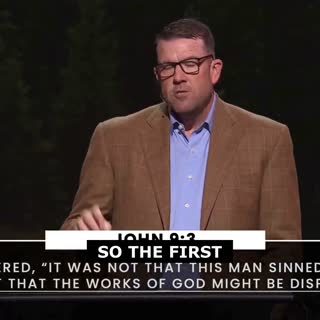Finding Purpose in Suffering: A Journey of Faith
Devotional
Sermon Summary
Bible Study Guide
Sermon Clips
"As long as I am in the world, I am the light of the world. So you'll remember Jesus gave two answers here. They're found in the same verse. The first answer comes at the beginning of verse 3. The second answer comes at the second half of verse 3. And in his first answer, Jesus explained, and we talked about this, that suffering is not simply understood. It's a complicated issue. Would we agree? Because while everybody suffers, the way you suffer might be different from the way I suffer. The things that you have had to endure are difficult from the things that I have had to endure. And yet we would acknowledge we have both experienced pain." [00:30:07] (39 seconds)
"And so the first thing that Jesus does is he dispels the common theological belief of that day that this man's birth defect of blindness must be either because of his inherent sin nature or because of some sinful action of his mom and dad. But Jesus says, no, there is some suffering that doesn't fit neatly into category one or category two." [00:30:58] (25 seconds)
"It is only existing because we live in a world that has been fractured by sin. Our world is broken. And there are some evidences, consequences of that brokenness that are going to lead to suffering that is just different. And so the first thing that Jesus says is, it's difficult to try to explain and fully understand. And so we understand suffering is complicated. Because again, while it is common, not everybody suffers the same. And therefore, it isn't always easily understood or explained." [00:31:42] (30 seconds)
"So the first answer Jesus gives is, listen, suffering is not always easily understood. It's a complicated issue. The second answer that Jesus gives is that suffering is never wasted with God. He's not wasting our hardship. Look at me. He's working in it." [00:34:02] (19 seconds)
"God is not wasting your blindness. God is not wasting your crisis. God is not wasting your diagnosis. He's actually working right in the middle of it. And then the most amazing thing happens when Jesus has his follow-up conversation with the man who can now see." [00:39:15] (20 seconds)
"Do you understand that the greatest miracle that takes place in this story is not the man's physical sight being restored, but rather that he is given spiritual sight for the very first time. Like it was through his physical blindness that Jesus brought an eternal spiritual sight." [00:40:34] (22 seconds)
"And faith is the space that exists. Between those two things, and that he would entrust us with these little girls and all the difficulty that their little lives entail has only served to draw us closer into a personal relationship and a greater affection for him. And I would not be the man I am." [00:50:08] (24 seconds)
"What I see now is that suffering is essentially a stewardship, and that faith is the tension that is found between the honesty of God is always good, and yes, this is pretty bad." [00:49:53] (15 seconds)
Ask a question about this sermon
"And so the first thing that Jesus does is he dispels the common theological belief of that day that this man's birth defect of blindness must be either because of his inherent sin nature or because of some sinful action of his mom and dad. But Jesus says, no, there is some suffering that doesn't fit neatly into category one or category two." [00:30:58] (25 seconds)
"It is only existing because we live in a world that has been fractured by sin. Our world is broken. And there are some evidences, consequences of that brokenness that are going to lead to suffering that is just different. And so the first thing that Jesus says is, it's difficult to try to explain and fully understand. And so we understand suffering is complicated. Because again, while it is common, not everybody suffers the same. And therefore, it isn't always easily understood or explained." [00:31:42] (30 seconds)
"So the first answer Jesus gives is, listen, suffering is not always easily understood. It's a complicated issue. The second answer that Jesus gives is that suffering is never wasted with God. He's not wasting our hardship. Look at me. He's working in it." [00:34:02] (19 seconds)
"God is not wasting your blindness. God is not wasting your crisis. God is not wasting your diagnosis. He's actually working right in the middle of it. And then the most amazing thing happens when Jesus has his follow-up conversation with the man who can now see." [00:39:15] (20 seconds)
"Do you understand that the greatest miracle that takes place in this story is not the man's physical sight being restored, but rather that he is given spiritual sight for the very first time. Like it was through his physical blindness that Jesus brought an eternal spiritual sight." [00:40:34] (22 seconds)
"And faith is the space that exists. Between those two things, and that he would entrust us with these little girls and all the difficulty that their little lives entail has only served to draw us closer into a personal relationship and a greater affection for him. And I would not be the man I am." [00:50:08] (24 seconds)
"What I see now is that suffering is essentially a stewardship, and that faith is the tension that is found between the honesty of God is always good, and yes, this is pretty bad." [00:49:53] (15 seconds)
















